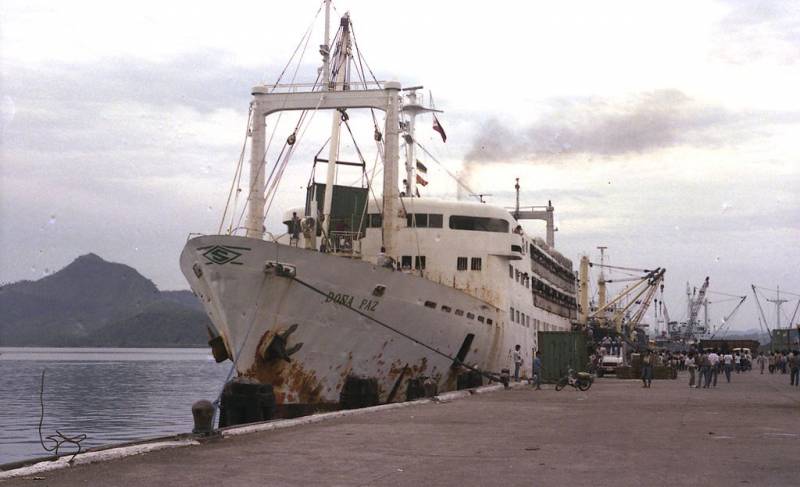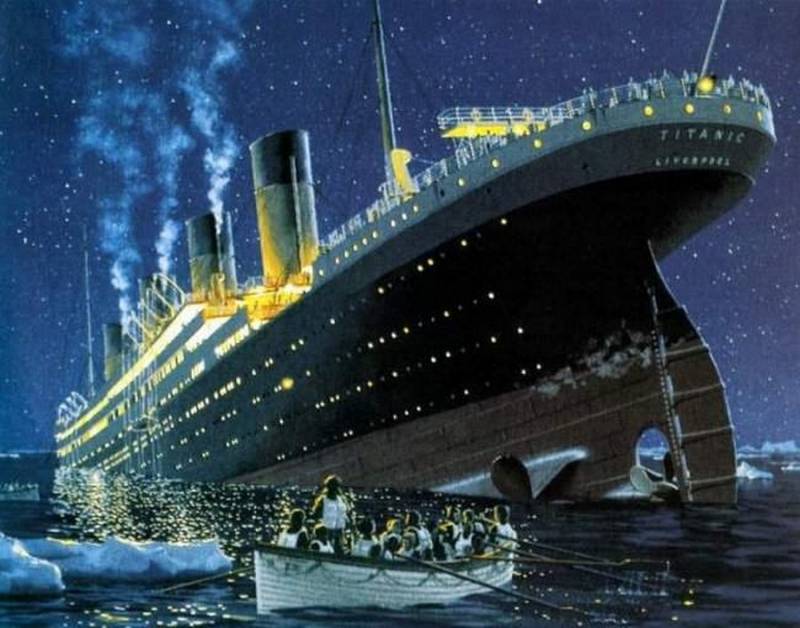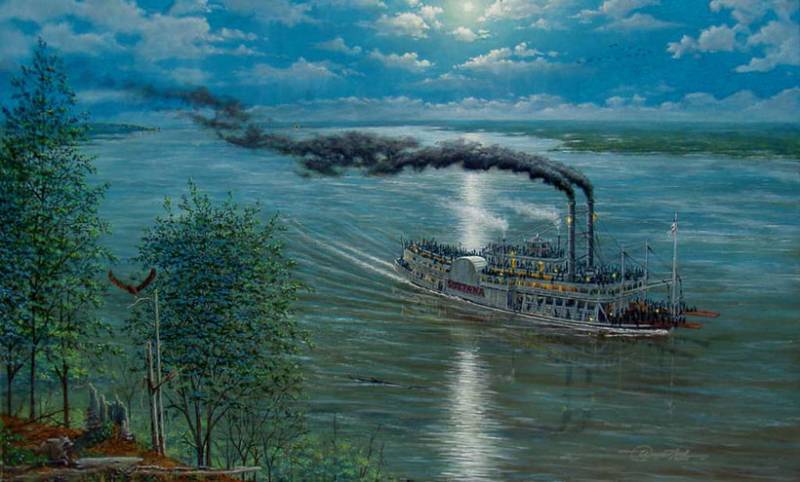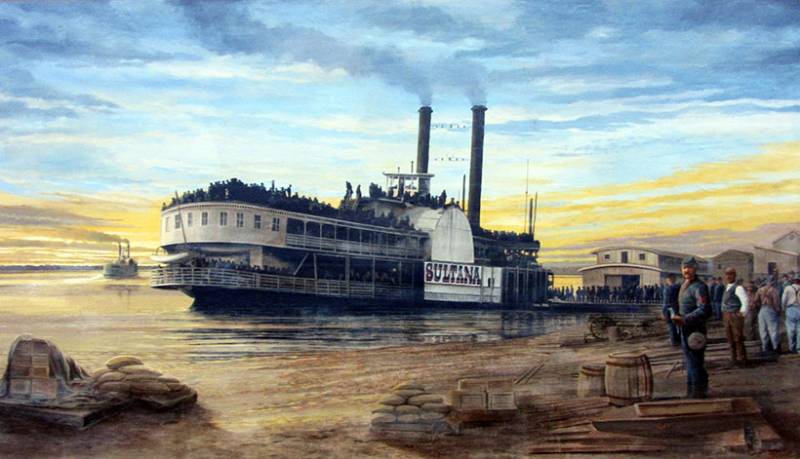"Sultana" on fire
Three tragedies outside the war
20 December 1987, the ferry Donna Paz, en route Manila-Katbalogan-Tacloban, collided with the Vector tanker in the Tablas Strait. On board the "Vector" was 8800 barrels of petroleum products, which resulted in a powerful blow. Following the fire occurred. At first the ships caught fire, and then the sea. The crew and numerous passengers were in a panic. No one could find life jackets (it later turned out that they were in a special safe under the lock). The situation was aggravated by the fact that the place of the collision was notorious for a large number of sharks. A couple of hours later the ferry went to the bottom, a little later - the tanker. Authorities learned about the tragedy only eight hours later. At the same time a rescue operation was organized.
From the water, only twenty-six survivors were obtained. And only two were from the team of "Vector", the rest - passengers of the ferry. And from the members of his crew no one was able to survive. The rescued received severe burns, but the doctors managed to return almost everyone from the next world (two people died of their wounds). Then, within a few days, about three hundred corpses were discovered. All the others are missing.
After the tragedy, the company “Sulpicio Lines”, which owned the ferry, said that on board was the 1553 man (60 - crew). But then horrendous details began to appear. The number of passengers increased to 1583. But a little later, various anonymous sources said that the ferry tickets were sold illegally, so most people simply were not on the official list. In addition, the children of the passengers were not recorded. It was reported that on board the “Donya Paz” there were from three to four thousand people. And the survivors said that the ferry was very overloaded, people had to huddle in the corridors and on the deck. Indirectly confirmed the version of the "hares" and the corpses. Since out of twenty-one bodies found by rescuers, only one was listed on the official list. And from the survivors - five.
Twelve years later, a special commission reopened the investigation. After long trials, it was possible to establish that the 4341 passenger and the 58 crew were on the ferry at the time of the collision. The team of "Vector" consisted of eleven people. In total, the tragedy claimed the lives of more than 4380 people.
It was possible to establish the main cause of the disaster - the negligence of the crew of both vessels. Neither the “Donier Paz” nor the “Vector” did not follow the course, there were no navigation instruments either. And the tanker did not have a special license to engage in maritime transport. It was not clear why, after the collision, none of the ships gave the SOS signal. There are two versions: either the radio stations failed after the impact, or they did not work at all.
As for the Titanic, its death occurred on the night of 14 on 15 of April 1912. The collision with an iceberg claimed the lives of about one and a half thousand people.
The death of “Donier Paz” and “Titanic” was the fault of the crew. In principle, the captain is also to blame for the crash of the Sultana. However, there is one evidence saying that the explosion on the ship was due to sabotage. Therefore, the fate of "Sultana" is worth talking in more detail.
Long way home
In 1865, the bloody confrontation between the North and the South ended. The victory went to the feds. And the crowds of soldiers yesterday went home. In the novel "Gone With the Wind" there is a mention of these events: "Month after month, a stream of terrible, bearded, ragged, scared-looking people with legs worn out in blood poured through the plantations." So the author Margaret Mitchell described the return of the defeated Confederate home. This morally suppressed but angry avalanche faced a frenzy of victory and freedom from the stream of federals who were once captured by southerners in the states of Georgia and Mississippi. And although the war was officially ended (on April 9, 1865, the confederate surrender was signed), clashes were inevitable. Therefore, not all northerners, as, indeed, the southerners managed to return home.
The Lincoln government was gravely concerned about the fate of its citizens, who were attacked by defeated Southerners. The acute problem required an urgent and effective solution. And soon it was found. The simplest and cheapest (which for a country that survived a civil war was a fact of no small importance) was the use of the waterway - Mississippi. The government set a period to which former prisoners of war were supposed to get to the port of Vicksburg in order to travel to Illinois by boat.
And it seems like the government has calculated everything and thought it over. She even motivated the carriers (after all, not every owner was willing to let soldiers into their ships because of their drunken uproar) offering them money for the passenger. The amount varied depending on the military rank. Therefore, they quickly agreed, because they were talking about money that was fantastic for those times (considering that several tens of thousands of people were required to transport). But it was this initiative that later played a cruel joke. Officials and owners of transportation companies, sensing a huge and easy income, immediately launched a large-scale war against each other. And soon Vicksburg turned into a battlefield. After some time, “at the end there was only one,” as stated in the old movie “Highlander”. In fact, two companies entered the final round of the confrontation - People’s Merchant Line and Atlantic-Mississippi. Now government officials have entered the business, which should have chosen the carrier company. It is curious that the first had two relatively capacious steamships, and the “Atlantic” had only one “Sultana”. True, this steamer was new, in contrast to the equipment of competitors. Logically, the officials had to conclude a contract with both companies, since even the three steamers would have been difficult to cope with the huge mass of passengers. But ... the people responsible for the choice preferred the Atlantic-Mississippi. But the “People’s Merchant Line” was left behind, as they say.
The problem of "Sultana"
Even before the flight, the senior engineer saw that one of the boilers of the steam engine was swollen. He informed the captain of the ship, Kass Mason, about the problem and urged him to stay in the port to do repairs. However, Mason, who was not only the captain, but also the co-owner of the company, took the engineer’s words frivolously. The only thing he ordered was to put a patch on the faulty boiler, deciding to do major repairs after the flight. After all, if there was a delay, Mason would have lost a solid contract. And this, of course, he did not want.
At the end of April 1865, the river wheelboat "Sultana" set out. This ship was designed to carry about two hundred and eighty people, but Mason, wanting to get rich as quickly as possible, waved his hand at it. Therefore, the ship departed from Vicksburg, on which there were nearly two thousand four hundred passengers! Of these, only eighty-five people were members of the crew, and another seven dozen were rich people who paid for individual cabins. And all the others are ordinary soldiers who wanted to return home. One of the passengers recalled: “We were crammed like a herring in a barrel. We slept standing up, because there was simply nowhere to lie down. ” But the memories of the soldier Chester Berry, who was captured in the Battle of Fredericksburg: “When we boarded the ship, on its decks fun reigned, as if at a wedding. I have never in my life seen a more joyful crowd than these poor hungry guys. Most of them were in captivity for a long time, some even for two years, many of them were injured. In a happy wait to see their father’s house soon, they did not pay attention to this terrible cramping. On the lower decks, the soldiers lay close together. Everybody had one cherished dream - to get home faster. ”
Captain Mason was in a hurry, more flights — more money. But the problem was that steam boilers are very susceptible to clay and sand, which is so rich in Mississippi. Therefore, “Sultana”, whose boilers were “watered” by the river, every now and then had to be stopped in order to clean and blow them. The captain did this with great reluctance, but he met the requirements of Nate Winthinger, a senior mechanic.
Six days have passed. And "Sultana" with grief in half, managed to still get to the major port city - Memphis. Here the ship took on board the new "passengers" - a few dozen live pigs. A "company" they accounted for about five tons of sugar. Of course, this neighborhood was hardly liked by anyone, but the soldiers did not become particularly indignant, because they were ready to endure any ordeal, just to be home as soon as possible. After making sure that the passengers are not going to rebel and rowdy, Mason ordered to send the ship to the port of St. Louis.
Fire night
The night has come. People, somehow settled on the backs of each other, fell asleep. At about three o'clock, when the "Sultana" was distant from the port at a distance of about eight miles, an explosion thundered. Residents of small towns and villages along the coast woke up and jumped out of their homes. Similarly, the people of Memphis behaved. People saw a huge glow illuminating the sky. There was talk in the crowd that the war was not over and the Southerners had ventured to take a new blow. This version was logical, since the rebel president Jefferson Davis was still at large. In addition, some units of the defeated Confederate army refused to surrender, declaring a guerrilla war to the victors.
But no, this version was wrong. Everything was much simpler - the same unreliable boiler did not withstand the excessive pressure and exploded. Behind him rushed and the remaining boilers. The explosion was of such strength that one of the high pipes of the steamer was torn off and thrown overboard, and the wooden case immediately caught fire. And the first flame engulfed the upper deck, where just most of the passengers were. In a short period of time, the fire destroyed the fasteners, and the deck collapsed into the hold.
The senior mechanic Nate Wintinger (by the way, he is the only surviving officer in the ship’s crew) wrote in his report: “At first I was numb with horror. It was a nightmare. Jumping up, I saw people swimming around in the water. From all sides, I heard the same cry: “Extinguish the fire!” The flames kept growing. All around reigned terrible chaos. I realized that fire would make me leave the deck. Having broken a wooden curtain from a cabin window, I jumped overboard. ”
Lieutenant Joe Elliot - one of the lucky ones, later recalled: “I did not understand what was happening around me. It all seemed like a nightmare. I got up and in some kind of oblivion that swept over me, I went to the stern of the steamer. On my way was the female salon. From the men's salon it was separated by a cloth curtain. I threw him back to go further, but some lady blocked my way. “What do you need here, sir,” she asked. But I did not pay attention to her and proceeded further. Having passed the female saloon, I found myself on the stern of the steamer and climbed the ladder to the upper deck. From there, along the side, I looked at the bow of the vessel. The picture was terrible. The decks collapsed, one pipe fell overboard, soldiers were rushing among the flames. Jumping out of the fire, they threw themselves into the water, jumping one and several people at a time. Water everywhere was littered with floating people. Jumping overboard, the soldiers hit not the water, but the heads of those who had previously jumped there, crippling both them and themselves ... ”
Those people who were not destined to die instantly from the explosion, burned alive or drowned. To reach the shore (and the river in that place was several kilometers wide), the exhausted people had no chance. For another hour the blazing "Sultana" kept afloat.
Here is what midshipman Earnshaw, the Essex watch-keeping battleship, saw a steamer passing by several hours before the tragedy: “A large paddle steamer exploded near our anchorage. Lit, sparks fly to the sky. " And this is an excerpt from the report of the captain of the battleship: “I immediately gave the order to prepare the lifeboats for launching, this was executed immediately. On an eight-hour boat, which was lowered earlier than other rowing ships, I headed for the rapids of the river. It was about two hours before dawn. It was still completely dark, the sky was overcast. The burning steamer went up the river. The only guide for us was the screams of wounded and drowning people. The first person we raised from the water to our boat was so numb that we could not warm it. The second, which we found, also soon died. Then we began to descend downstream, to Fort Pickering. Standing on the shore of the watch fort shot at us and shouted that we moored to the shore. We were forced to approach him at a time when the unfortunates were very close begging for help, but could no longer hold on to the water. We reached the shore. The sentry ordered me to get off the boat to the shore. I asked him why he shot at us. He replied that he followed the instructions. I explained to this guard what happened on the river and that we are saving the drowning. He did not answer, and we again went to the rapids. There we met our geek who saved the drowning. People are so numb in the water that they were loaded into boats as if they were dead. "
About the shooting. She did not stop. As soon as the boat or the boats approached the coast, the watchmen of Fort Pickering immediately opened fire. The fact is that the northerners were waiting for sabotage by the partisan detachments of the southerners, so there was an order to shoot at any boats that came too close to the shore. The soldiers simply carried out the order, in the predawn darkness they could not make out who was in the boats — the enemies or the rescue team from the battleship. And the shots did not stop until the head of the fort personally walked around all the posts and ordered a cease-fire.
According to historians and researchers of that tragedy, three explosions that followed one another took the lives of at least eight hundred people. About a thousand more were burned or drowned. And over the next few weeks on the banks of the Mississippi now and then threw the corpses of the passengers of the ship.
But the catastrophe did not produce much resonance, although such an event should have put the whole country on its ears. The fact is that it was eclipsed by a much more terrible tragedy (on the scale of the state, and not on the scale of specifically taken families whose husbands, fathers or brothers died). Indeed, less than two weeks before the death of the Sultana, an attempt was made on the life of President Abraham Lincoln. April 15 actor John Booth, who was an ardent supporter of the southerners who lost the war, shot the president in the head during the performance. The next day, Lincoln, without regaining consciousness, passed away. All the people mourned, so the explosion of the steamer was not particularly "noticed."
It must be said that the government itself (secretly, but strictly) took care of this. After all, it was clear to everyone - the tragedy happened because of greedy officials and the captain. Too many influential and respected people one way or another, but were involved in the death of the ship.
True, a few years later, a former spy and saboteur of the Southern army, Robert Lauden, on his deathbed admitted that the alleged explosion of the Sultana was his own work. Like, he planted a bomb disguised as a piece of coal. By the way, Southerners often resorted to this technique during the war. But is it true that Louden blew up the steamer, or did the clouded mind decide to take “glory” before he died? This is never to know.





Information